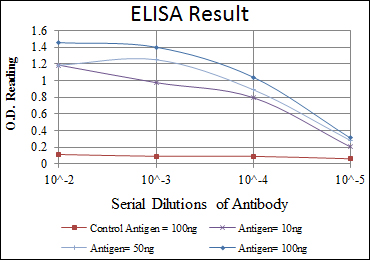RBP4 Monoclonal Antibody
- Catalog No.:YM0554
- Applications:WB;IHC;IF;FCM;ELISA
- Reactivity:Human
- Target:
- RBP4
- Gene Name:
- RBP4
- Protein Name:
- Retinol-binding protein 4
- Human Gene Id:
- 5950
- Human Swiss Prot No:
- P02753
- Mouse Swiss Prot No:
- Q00724
- Immunogen:
- Purified recombinant fragment of human RBP4 expressed in E. Coli.
- Specificity:
- RBP4 Monoclonal Antibody detects endogenous levels of RBP4 protein.
- Formulation:
- Liquid in PBS containing 50% glycerol, 0.5% BSA and 0.02% sodium azide.
- Source:
- Monoclonal, Mouse
- Dilution:
- WB 1:500 - 1:2000. IHC 1:200 - 1:1000. IF 1:200 - 1:1000. Flow cytometry: 1:200 - 1:400. ELISA: 1:10000. Not yet tested in other applications.
- Purification:
- Affinity purification
- Storage Stability:
- -15°C to -25°C/1 year(Do not lower than -25°C)
- Other Name:
- RBP4;Retinol-binding protein 4;Plasma retinol-binding protein;PRBP;RBP
- Molecular Weight(Da):
- 23kD
- References:
- 1. Diabetologia. 2008 Aug;51(8):1423-8.
2. J Clin Endocrinol Metab. 2008 Aug;93(8):3142-8.
- Background:
- retinol binding protein 4(RBP4) Homo sapiens This protein belongs to the lipocalin family and is the specific carrier for retinol (vitamin A alcohol) in the blood. It delivers retinol from the liver stores to the peripheral tissues. In plasma, the RBP-retinol complex interacts with transthyretin which prevents its loss by filtration through the kidney glomeruli. A deficiency of vitamin A blocks secretion of the binding protein posttranslationally and results in defective delivery and supply to the epidermal cells. [provided by RefSeq, Jul 2008],
- Function:
- disease:A deficiency of vitamin A blocks secretion of the binding protein post-translationally and results in defective delivery and supply of vitamin to the epidermal cells (a condition associated with a dermatosis).,disease:Defects in RBP4 are a cause of retinol-binding protein deficiency [MIM:180250]. This condition causes night vision problems. It produces a typical "fundus xerophthalmicus," featuring a progressed atrophy of the retinal pigment epithelium.,function:Delivers retinol from the liver stores to the peripheral tissues. In plasma, the RBP-retinol complex interacts with transthyretin, this prevents its loss by filtration through the kidney glomeruli.,mass spectrometry: PubMed:12237133,mass spectrometry: PubMed:7666002,online information:Retina International's Scientific Newsletter,online information:Retinol-binding protein 4 entry,similarity:Belongs to the calycin superfamil
- Subcellular Location:
- Secreted .
- Expression:
- Detected in blood plasma and in urine (at protein level).
- June 19-2018
- WESTERN IMMUNOBLOTTING PROTOCOL
- June 19-2018
- IMMUNOHISTOCHEMISTRY-PARAFFIN PROTOCOL
- June 19-2018
- IMMUNOFLUORESCENCE PROTOCOL
- September 08-2020
- FLOW-CYTOMEYRT-PROTOCOL
- May 20-2022
- Cell-Based ELISA│解您多样本WB检测之困扰
- July 13-2018
- CELL-BASED-ELISA-PROTOCOL-FOR-ACETYL-PROTEIN
- July 13-2018
- CELL-BASED-ELISA-PROTOCOL-FOR-PHOSPHO-PROTEIN
- July 13-2018
- Antibody-FAQs
- Products Images
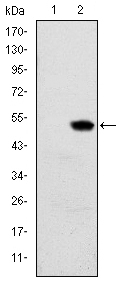
- Western Blot analysis using RBP4 Monoclonal Antibody against HEK293 (1) and RBP4-hIgGFc transfected HEK293 (2) cell lysate.
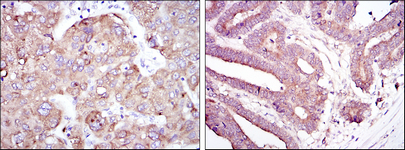
- Immunohistochemistry analysis of paraffin-embedded liver cancer tissues (left) and stomach cancer tissues (right) with DAB staining using RBP4 Monoclonal Antibody.
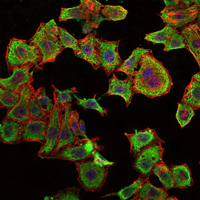
- Immunofluorescence analysis of HepG2 cells using RBP4 Monoclonal Antibody (green). Blue: DRAQ5 fluorescent DNA dye. Red: Actin filaments have been labeled with Alexa Fluor-555 phalloidin.
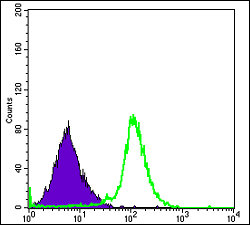
- Flow cytometric analysis of HepG2 cells using RBP4 Monoclonal Antibody (green) and negative control (purple).
